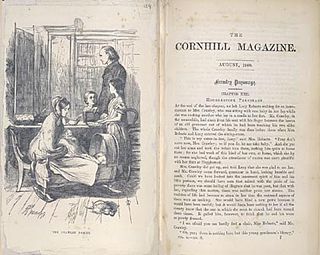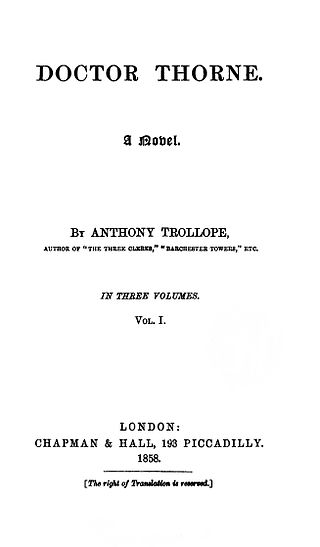
Anthony Trollope was an English novelist and civil servant of the Victorian era. Among his best-known works is a series of novels collectively known as the Chronicles of Barsetshire, which revolves around the imaginary county of Barsetshire. He also wrote novels on political, social, and gender issues, and other topical matters.

Framley Parsonage is a novel by English author Anthony Trollope. It was first published in serial form in the Cornhill Magazine in 1860, then in book form in April 1861. It is the fourth book in the Chronicles of Barsetshire series, preceded by Doctor Thorne and followed by The Small House at Allington.

Phineas Finn is a novel by Anthony Trollope and the name of its leading character. The novel was first published as a monthly serial from 1867 to 1868 and issued in book form in 1869. It is the second of the "Palliser" series of novels. Its sequel, Phineas Redux, is the fourth novel in the series.

Phineas Redux is a novel by Anthony Trollope, first published between 1873 and 1874 as a serial in The Graphic. It is the fourth of the "Palliser" series of novels and is a sequel to the second book of the series, Phineas Finn.

The Duke's Children is a novel by Anthony Trollope, first published between 1879 and 1880 as a serial in All the Year Round. It is the sixth and final novel of the Palliser series. In 2020, the original text of The Duke's Children was restored for publication of a new edition led by editor Steven Amarnick.

The Eustace Diamonds is a novel by Anthony Trollope, first published between 1871 and 1873 as a serial in the Fortnightly Review. It is the third of the "Palliser" series of novels, though the characters of Plantagenet Palliser and his wife Lady Glencora are only in the background.

Darby and Joan is a proverbial phrase for a married couple content to share a quiet life of mutual devotion.

Barsetshire is a fictional English county created by Anthony Trollope in the series of novels known as the Chronicles of Barsetshire (1855-1867). The county town and cathedral city is Barchester. Other towns named in the novels include Silverbridge, Hogglestock and Greshamsbury.
The Chronicles of Barsetshire is a series of six novels by English author Anthony Trollope, published between 1855 and 1867. They are set in the fictional English county of Barsetshire and its cathedral town of Barchester. The novels concern the dealings of the clergy and the gentry, and the political, amatory, and social manoeuvrings among them.

The Last Chronicle of Barset is a novel by English author Anthony Trollope, published in 1867. It is the sixth and final book in the Chronicles of Barsetshire series, preceded by The Small House at Allington. The novel is set in the fictional county of Barsetshire and deploys characters from the earlier novels, whilst concentrating on the personnel associated with the cathedral. The main narrative thread is catalysed by the loss of a cheque which had been in the possession of the Reverend Josiah Crawley, and the subsequent reactions of his friends and enemies. Trollope drew inspiration from his father and mother in the creation of the Rev. and Mrs. Crawley. In his autobiography, Trollope regarded this novel as "the best novel I have written.", although later commentators do not agree with this judgement. The serialisation was illustrated by G H Thomas who was selected by the publisher, though Trollope had wished for Millais who had illustrated The Small House at Allington.

Doctor Thorne is a novel bythe English author Anthony Trollope, published in 1858. It is the third book in his Chronicles of Barsetshire series, between Barchester Towers and Framley Parsonage. The idea of the plot was suggested to Trollope by his brother Thomas. Michael Sadleir places it as one of the five best of Trollope's novels and the best of the Barsetshire novels.

Can You Forgive Her? is a novel by Anthony Trollope, first published in serial form in 1864 and 1865. It is the first of six novels in the Palliser series, also known as the Parliamentary Novels.

The Prime Minister is a novel by Anthony Trollope, first published in 1876. It is the fifth of the "Palliser" series of novels.

The Pallisers is a 1974 BBC television adaptation of Anthony Trollope's Palliser novels. Set in Victorian era England with a backdrop of parliamentary life, Simon Raven's dramatisation covers six novels and follows the events and characters over two decades.

Barchester Pilgrimage is a 1935 novel by Ronald Knox, published in London by Sheed and Ward, in which Knox picks up the narrative of the original Chronicles of Barsetshire where Anthony Trollope breaks off. Knox follows the fortunes of the children and grandchildren of Trollope's characters up to the time of writing (1934), with some gentle satire on the social, political and religious changes of the 20th century. The novel was reprinted in 1990 by the Trollope Society.
The American Senator is a novel written in 1877 by Anthony Trollope. Although not one of Trollope's better-known works, it is notable for its depictions of rural English life and for its many detailed fox hunting scenes. In its anti-heroine, Arabella Trefoil, it presents a scathing but ultimately sympathetic portrayal of a woman who has abandoned virtually all scruples in her quest for a husband. Through the eponymous Senator, Trollope offers comments on the irrational aspects of English life.

Lady Anna is a novel by Anthony Trollope, written in 1871 and first published in book form in 1874. The protagonist is a young woman of noble birth who, through an extraordinary set of circumstances, has fallen in love with and become engaged to a tailor. The novel describes her attempts to resolve the conflict between her duty to her social class and her duty to the man she loves.

The Claverings is a novel by Anthony Trollope, written in 1864 and published in 1866–67. It is the story of a young man starting out in life, who must find himself a profession and a wife; and of a young woman who makes a marriage of convenience and must accept the consequences of her decision.

Rachel Ray is an 1863 novel by Anthony Trollope. It recounts the story of a young woman who is forced to give up her fiancé because of baseless suspicions directed toward him by the members of her community, including her sister and the pastors of the two churches attended by her sister and mother.
"Tell it to the Marines" is an English-language idiom, originally with reference to Britain's Royal Marines, connoting that the person addressed is not to be believed. The phrase is an anapodoton – the full phrase is "tell it to the marines because the sailors won't believe you", but only the first clause is usually given, standing for the whole. The idiom depends on its implication that marines, unlike the speaker, will gullibly believe nonsense.
















